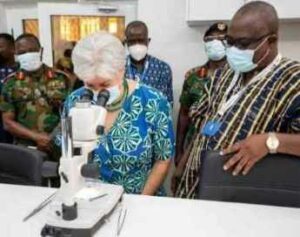Ghana opens first US government funded malaria-focused laboratory at military hospital

Ghana has opened the Joint Operational Vector-borne Disease Entomology Laboratory at 37 Military Hospital in Accra. It is the first lab of its kind in Ghana made possible with the strong military-to-military cooperation between Ghana and the US.
Funded by the US government through the US Africa Command (AFRICOM) Africa Malaria Task Force (AMTF), the laboratory will establish a combined entomology research and control programme.
Along with US Ambassador, Stephanie Sullivan, representatives of the Ghana Armed Forces, Ghana Police Service, National Malaria Control Programme, and Noguchi Memorial Institute of Medical Research participated in the ceremonial event to inaugurate the laboratory.
The laboratory will support the Ministry of Defense and Ministry of Health malaria control programmes with mosquito surveillance, directing insecticide applications, insecticides resistance monitoring, and mapping of potential disease-causing mosquitoes. The lab will also be a regional entomology hub in West Africa for other AMTF partners to benefit from in the future.
Ms. Sullivan, stressing the strong bilateral military cooperation between the United States and Ghana that underpinned the establishment of the new laboratory and noted that, “It is through programmes such as AMTF that the US government has been able to assist in reducing the number of malaria deaths in Ghana and around the globe. We look forward to seeing the continued progress of our joint efforts through this new laboratory. Together, we will end this mosquito-borne disease within this generation.”
Malaria has a negative effect on productivity and economic development. The World Health Organization reports that malaria is responsible for one in five deaths of African children under age five every year. For all of these reasons, I am happy about this new lab, which began with the AMTF, a US AFRICOM initiative started in 2011, Sullivan said.
The aim of the initiative is to advance the global fight against malaria through capacity building programmes and multi-country mil-to-mil collaboration in Africa. Since its inception in Ghana, the AMTF has provided comprehensive skills in malaria microscopy and medical entomology and fostered collaboration between the Ghana Armed Forces and the National Malaria Control Programme.
Beyond the funds for this project, the US government also committed brainpower. Project leads and key stakeholders include the world-renowned Walter Reed Army Institute of Research in Emerging Infectious Disease Branch as well as the US Navy Entomology Center of Excellence.
The US government has long recognized malaria as a prime example of how infectious diseases affect global health security and continues to affirm its commitment to thwarting this disease. “It will take a similarly concerted global effort to combat and eventually eradicate malaria once and for all,” Ms. Sullivan noted.
For over two decades, the United States has provided more than $140 billion in global health assistance through programmes like AMTF and the US President’s Malaria Initiative (PMI) as well as through multilateral efforts like the Global Fund to Fight AIDS, Tuberculosis, and Malaria.
According to the ambassador, together with its partners, PMI has helped save 7.6 million lives and prevent 1.5 billion infections.
Meanwhile, according to PMI’s 15th Annual Report released earlier, Ghana’s efforts to sustain essential malaria services amidst the COVID-19 pandemic continue to save lives which is a demonstration of the significant progress the United States and Ghana have made in the partnership to fight malaria.
In the words of US Global Malaria Coordinator, Dr Raj Panjabi, “Ending malaria matters. It matters because it builds health systems that keep us all safer, including networks of community health workers, clinics and labs that help us fight malaria while protecting us from emerging threats like COVID-19.”
By Theodora Aidoo
Copyright ©2021 by NewsBridge Africa
All rights reserved. This article or any portion thereof may not be reproduced or used in any manner whatsoever without the express written permission of the publisher except for the use of brief quotations in reviews.
